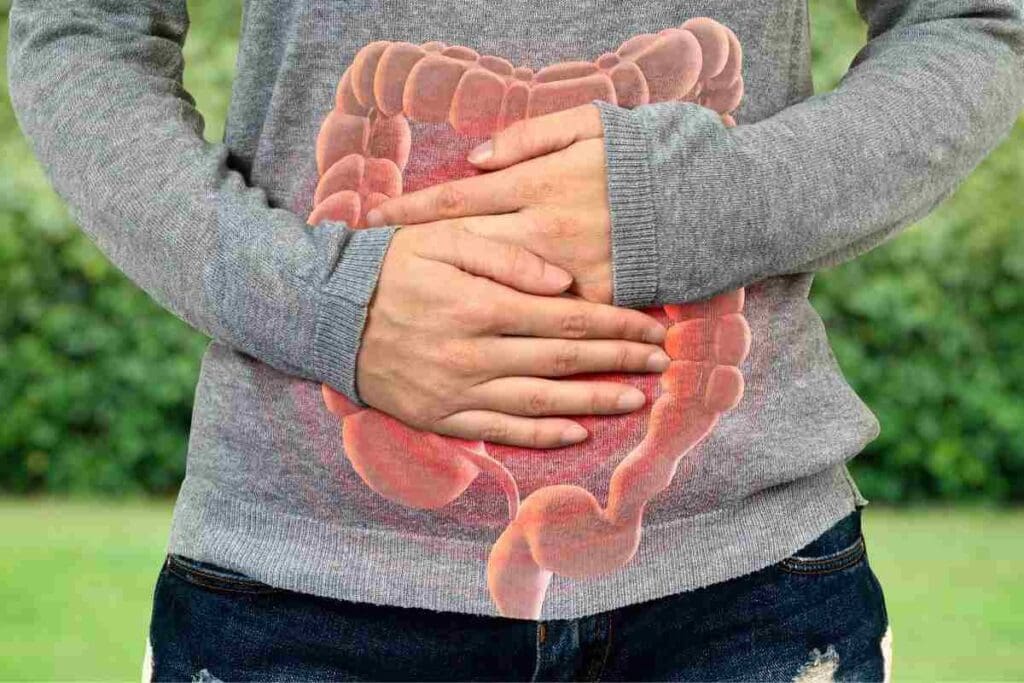Hernias can be puzzling and uncomfortable. Many people wonder if a hernia can cause constipation.
Dealing with a hernia is distressing. If it leads to constipation, it makes things worse. A hernia happens when an organ or tissue bulges through a weak spot in the muscle or tissue. This can block the intestine, causing symptoms like hard or small bowel movements, stomach pain, and bloating.
It’s important to understand how hernias and constipation are connected. At LivHospital, we stress the need to treat hernia complications quickly and well.

Key Takeaways
- A hernia can potentially cause constipation by partially blocking the intestine.
- Symptoms of constipation due to a hernia include infrequent bowel movements, abdominal discomfort, and bloating.
- Understanding the link between hernias and constipation is vital for proper medical care.
- Prompt medical attention is necessary to address hernia-related complications.
- LivHospital specializes in providing high-quality care for hernia-related issues.
Understanding Hernias and Their Impact on Digestion
A hernia happens when an organ or tissue bulges through a weak spot in the muscle. This can really mess with digestion. At LivHospital, we use the newest medical methods to treat hernias and help with digestive problems.
What Is a Hernia?
A hernia occurs when part of an organ or fatty tissue pushes through a weak spot. This can cause hernia symptoms like pain and visible bulges. Knowing about hernias helps us manage their impact on digestion.

Types of Hernias
There are many types of hernias, each affecting digestion differently:
- Inguinal Hernia: This happens when tissue bulges through a weak spot in the groin area.
- Umbilical Hernia: It occurs near the belly button when part of the intestine bulges through.
- Hiatal Hernia: This is when the stomach bulges up into the chest through a diaphragm opening.
- Ventral Hernia: It develops at other sites, like through a scar or weakened area in the abdominal wall.
Each hernia type has its own symptoms of hernia disease, from mild discomfort to severe pain.
How Hernias Affect Normal Digestive Function
Hernias can mess with digestion in different ways. For example, a hiatal hernia can cause acid reflux and trouble swallowing. An inguinal or ventral hernia can lead to bowel obstruction, causing constipation and pain.
At LivHospital, our team is ready to diagnose and treat hernias. We use the latest medical tech and care to lessen their impact on digestion. This way, we help patients manage their hernia problems and live better lives.
The Hernia-Constipation Connection
A hernia can block the flow of intestinal contents, leading to constipation. This blockage can cause mild discomfort or severe health issues. We will look at how hernias affect digestion, including mechanical aspects, statistics, and the link between hernias and constipation.
Mechanical Obstruction: How Hernias Block Intestinal Flow
Hernias can block the intestine by physically obstructing it. When a hernia occurs, an organ or tissue bulges through a weak spot. This often happens in the groin area near the pubis.
If the herniated tissue gets trapped, it can stop the flow of intestinal contents. This leads to constipation. The omentum, a fatty tissue layer, can also get trapped, making things worse.
Trapped hernias, mainly in the groin or lower abdomen, are a common cause of small bowel obstruction. This can cause severe constipation, pain, and other symptoms.

Statistical Evidence: Prevalence and Risk Factors
Research shows hernias increase the risk of constipation. People with hernias, like inguinal hernias, are more likely to have constipation. The high rate of constipation in hernia patients highlights the need for care that addresses both issues.
Understanding the statistics and risk factors helps healthcare providers target interventions. Identifying high-risk patients can prevent serious complications like hernia strangulation.
The Bidirectional Relationship
The connection between hernias and constipation goes both ways. Hernias can cause constipation by blocking the intestine. But constipation can also make hernias worse by increasing pressure in the abdomen.
Constipation can cause a hernia to become blocked or strangulated, reducing blood flow. A hernia can also lead to constipation, showing the need for effective management of both conditions.
Complications of Untreated Hernia-Related Constipation
Ignoring hernia-related constipation can lead to serious problems. When constipation is linked to a hernia, not treating it can cause severe issues. We will look at the risks and why medical help is key.
Incarcerated Hernias: When Tissue Gets Trapped
An incarcerated hernia happens when tissue gets stuck and can’t go back. This is serious because it can cut off blood flow, leading to tissue death. Up to 30% of femoral hernias become incarcerated, which is a big medical emergency.
Symptoms of an incarcerated hernia include severe pain, tenderness, and redness. If you have these symptoms of hernia disease, get medical help fast.
Strangulated Hernias: A Medical Emergency
A strangulated hernia occurs when blood flow to the herniated tissue is cut off. This is a medical emergency that needs immediate care. Strangulation occurs when the hernia is constricted, cutting off blood flow, which can lead to tissue necrosis and potentially life-threatening complications.
If your small intestine is caught in a hernia, you might have digestion changes, like constipation. You’ll also have strangulated hernia symptoms if blood flow to your hernia is cut off, such as severe abdominal pain, nausea, and vomiting.
Partial vs. Complete Bowel Obstruction
Hernia-related constipation can cause partial or complete bowel obstruction. A partial bowel obstruction is when the intestine is only partially blocked. A complete bowel obstruction is when the intestine is totally blocked. Both are serious and need medical evaluation.
Understanding the risks of bowel obstruction is key. If you have persistent constipation, abdominal pain, or vomiting, get medical help. Knowing what a hernia feels like and recognizing signs of complications can save your life.
In conclusion, untreated hernia-related constipation can be very dangerous. It’s important to know the risks and seek medical help if symptoms don’t get better or get worse.
Identifying and Treating Hernia-Related Constipation
Hernia-related constipation is a complex issue. At LivHospital, we tackle both the hernia and constipation. This approach helps provide relief and prevent further problems.
When to Seek Medical Attention
If you have a hernia and constipation, get medical help. Severe pain, nausea, vomiting, or fever are warning signs. These could mean a strangulated hernia, a serious emergency. For more on hernias and constipation, checkHealthline’s guide.
Treatment Options
Fixing hernia-related constipation means treating both issues. Each treatment is custom-made, based on the hernia type and the patient’s health. Sometimes, surgery is needed to fix the hernia and help with constipation. LivHospital provides full care, including surgery and support after, for patients with these problems.
Our strategy includes:
- Thorough checks to find out the cause and how bad the hernia and constipation are
- Custom plans that might include changes in lifestyle, medicine, or surgery
- Modern surgery for hernia repair, to cut down on recovery time and risks
Early medical help and a treatment plan made just for you can ease hernia-related constipation. It can also make life better for you.
Conclusion
It’s important to understand how hernias and constipation are connected. We’ve seen how hernias can affect digestion and cause constipation.
At LivHospital, we stress the need to see a doctor if symptoms don’t go away. We offer top-notch healthcare and support for international patients. This ensures they get the care they need.
Knowing the signs of hernia-related constipation is the first step to getting help. If you’re experiencing ongoing or severe symptoms, see a healthcare professional. They can guide you towards the right treatment.
FAQ’s:
Can a hernia cause constipation?
Yes, hernias, like inguinal or ventral ones, can cause constipation. They can block the normal flow of intestinal contents.
How do I know if my constipation is related to a hernia?
If you have constipation and symptoms like a bulge or pain in your abdomen or groin, see a doctor. They can check if it’s related to a hernia.
What is the treatment for hernia-related constipation?
Treatment usually involves fixing the hernia with surgery. Sometimes, doctors might also use medication or suggest lifestyle changes to help with constipation.
Can untreated hernia-related constipation lead to complications?
Yes, if not treated, it can lead to serious problems. These include incarcerated or strangulated hernias, which need urgent medical care.
What is the difference between an incarcerated and a strangulated hernia?
An incarcerated hernia occurs when tissue gets trapped. A strangulated hernia is worse, where the blood supply to the trapped tissue is cut off. This one needs emergency surgery.
How can I prevent hernia-related constipation?
To prevent it, eat well, drink plenty of water, and exercise. Also, get any hernias treated by a doctor.
What are the risks associated with partial or complete bowel obstruction due to a hernia?
Bowel obstruction can cause severe pain, vomiting, and constipation. If not treated quickly, it can lead to serious issues.
When should I seek medical attention for hernia-related symptoms?
Seek medical help right away for severe pain, vomiting, or if the hernia looks different. These signs can mean a serious problem.
References:
- American College of Surgeons. (2020). Inguinal Hernia Repair. Retrieved fromhttps://www.facs.org/
- Hernia. (2022). 26(2).https://doi.org/10.1007/s10029-022-01584-9
- Kockerling, F., & Simons, M. P. (2018). The treatment of incarcerated and strangulated hernias. Hernia, 22(5), 785–790.https://doi.org/10.1007/s10029-018-1803-5
- Simons, M. P., Smietanski, M., & The European Hernia Society. (2018). International guidelines for groin hernia management. Hernia, 22(1), 1–165.https://doi.org/10.1007/s10029-017-1678-5



































